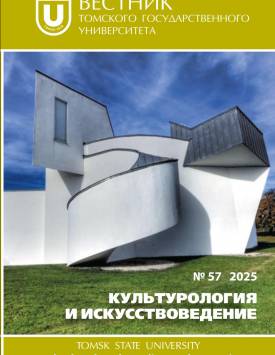Cultural static-dynamic features in the frame of the cogni-tive-pragmatic programs theory (basic provisions)
The present article considers a cognitive modeling of the cultural static-dynamic specifics based on system principles and the original concept of cognitive-pragmatic programs (CPP). At the stage of complex-multilevel interpretation of culture, an urgent scientific problem is modeling the internal logic of static and dynamic principles. The purpose of the article is to present this logic in a model that permeates the entire “cognitive-mental body” of culture. The scientific novelty consists in understanding culture as a system of interrelated programs and the possibility of a model to represent and analyze intra- and inter-program connections of any type and level. Therefore, in addition to the systematic approach, the author's research method combining cognitive and semiotic principles is the leading one. The cultural “statics” and “dynamics” in cognitive models are non-linear. The actual task is to comprehend and form their internal logic. In the context of the CPP theory, the static-dynamic mechanism is realized simultaneously in three cognitive-mental projection zones: a) “intra-program”; b) “interprogram”; c) “metaprogram”. This triplicity can manifest itself both as a change in the status of the program, as a change in the status of the code, and as a change in the cognitive-mental status of the CPP generator. In each of the abovementioned zones, one of the three specific types of culture development -stadial-syntagmatic; paradigm-subsystem; paradigm-systemic - is formed. Within the framework of the stadial-syntagmatic type of development, each stage of CPP modeling has a specific “static-dynamic valence”: a) the stage of formation of the CPP - “priority-indefinite valence” (non-differentiation of quantitative and qualitative); b) the stage of the “primary” functioning of the CPP - “priority-static valence” (dominance of the static); c) the stage of cognitive-mental recoding followed by the transition from one “cycle” of modeling to another - “priority-dynamic valency” (dominance of the dynamic). At the moment of transition to other types of development, “cognitive-mental valence” turns into program valence (change of status while maintaining content). Each type of CPP is characterized by its own cognitive-mental valency: a) the system of nationally specific CPPs (system of genetic codes) - “priority-indefinite valence"”; b) the system of metanarrative CPPs (the system of cultural codes) - “priority-static valency”; c) the system of “derivatives” of the CPP (the system of cognitive-mental codes) - “priority-dynamic valence” The author declares no conflicts of interests.
Keywords
cognitive-pragmatic program (CPP), metadisciplinary approach, cognitive-mental valency, cognitive-mental recoding, static-dynamic mechanism, metanarrative CPP, “derivative” CPP, national-specific CPP, cognitive-mental transitionAuthors
| Name | Organization | |
| Ivanov Dmitry I. | Xi'an Shiyou University | Ivan610@yandex.ru |
References

Cultural static-dynamic features in the frame of the cogni-tive-pragmatic programs theory (basic provisions) | Tomsk State University Journal of Cultural Studies and Art History. 2025. № 57. DOI: 10.17223/22220836/57/6
